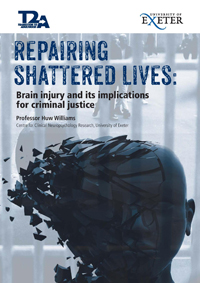Today sees the release of a major new Transition to Adulthood Alliance report on the impact that acquired brain injuries can have on young people in childhood and in their transition to adulthood, and outlines the criminal justice consequences if these injuries go untreated.
In Repairing Shattered Lives: Brain injury and its implications for criminal justice, Prof Huw Williams of the University of Exeter notes that a shocking 60% of young people in custody report having experienced some kind of brain injury. Acquired brain injuries can lead maturing brains to “misfire,” interrupting the development of temperance (ability to restrain and moderate actions), social judgement and the ability to control impulses. If undetected these injuries, which may be the result of falls, sporting injuries, car accidents or fights, can leave young people untreated and increase their risk of offending.
Report author Prof Huw Williams said:
“The young brain, being a work in progress, is prone to “risk taking” and so is more vulnerable to getting injured in the first place, and to suffer subtle to more severe problems in attention, concentration and managing one’s mood and behaviour.
“It is rare that brain injury is considered by criminal justice professionals when assessing the rehabilitative needs of an offender even tough recent studies from the UK have shown that prevalence of TBI among prisoners is as high as 60%. Brain injury has been shown to be a condition that may increase the risk of offending, and it is also a strong ‘marker’ for other key factors that indicate risk for offending.”
The report recommends early intervention to identify and manage brain injuries, including training for school staff, to ensure that young people receive the required neuro-rehabilitative support. Repairing Shattered Lives also calls for increased awareness of brain injuries throughout the criminal justice process, including screening of young people as standard.
Another report also published today, by the Office of the Children’s Commissioner, identifies the wider impact that brain injuries can have on maturing brains, as well as their social consequences, and adds further weight to the findings by T2A.
Prof. Huw Williams will also be presenting at a Disabilities Trust brain injury and offending seminar as part of the launch of groundbreaking research on brain injury among adult male offenders on the 14th November 2012. You can see more information about the event here.
You can read an executive summary here or the report in full here.
The report has been covered by the Independent, Guardian, BBC and Children and Young People Now.

